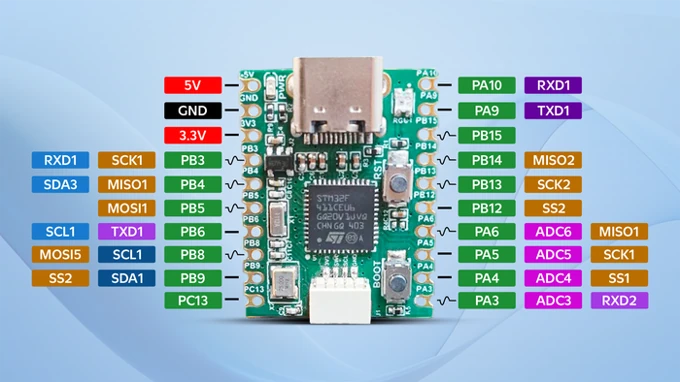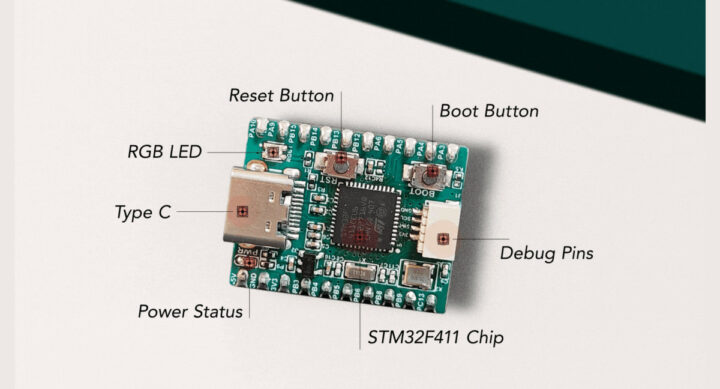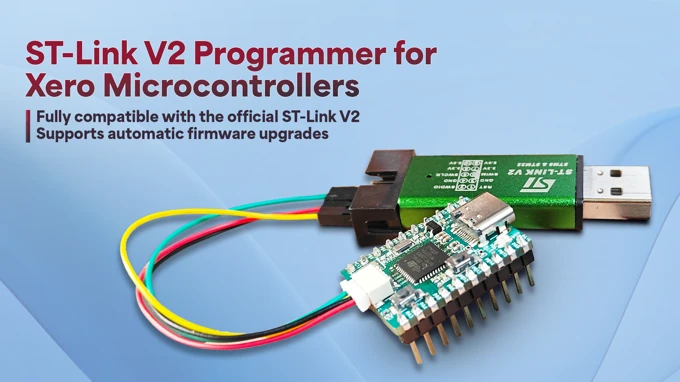Xero MCU is a small STMicro STM32F411 Arm Cortex-M4F microcontroller board with a USB-C port, twenty through and castellated holes for GPIOs, a Debug connector, Reset and Boot buttons, and a few LEDs.
The 100 MHz MCU embeds 512KB flash and 128KB SRAM, and the board is said to be designed for hobbyists, students, and professionals. For reference, the Xero MCU board features the same STM32F411CEU6 microcontroller found in the Black Bill board. However, it’s quite shorter at about half the size, and features castellated edges, making it suitable for soldering on a baseboard.
Xero MCU specifications:
- Microcontroller – STMicro STM32F411CEU6 Arm Cortex-M4F MCU @ 100MHz with 512KB Flash, 128KB SRAM
- USB – 1x USB Type-C port for power and programming
- Expansion – 2x 20-pin through and castelled holes with up to 17x GPIO, I2C, 2x SPI, 2x UART, 4x ADC, 5V, 3.3V, and GND
- Debugging – 4-pin debug connector
- Misc
- Boot and Reset buttons
- Power LED, RGB LED
- Dimensions – 28 x 21mm (estimated)

The board can be programmed with C/C++, Arduino, MicroPython, or CircuitPython and is compatible with the ST-Link V2 programmer for more advanced debugging. I could not find code specific to the Xero MCU board, but we’re told that STM32Cube, PlatformIO, and other popular IDEs can be used. Since it should be firmware-compatible with the Black Pill board (minus the missing pins due to the smaller design), you can just search for resources for the board or STM32F411 to get started.
Tina (Sanket Garg) launched the Xero MCU on Kickstarter with a lowly $100 funding target that’s easily been surpassed. Two rewards are available: the Xero MCU without headers for $15, and the Xero MCU with headers for $20. Shipping adds $10 worldwide. The campaign is registered in the US, so I suppose it means it ships from there, and no tariffs are applied to US customers, while, for instance, EU users would be hit by VAT.
It might be better suited than the Black Pill for space-constrained applications, but it’s also more expensive. For reference, the STM32F411 version of the board sells for about $14-$15 on Amazon and a little over $3 on AliExpress before shipping and taxes. Note that cheaper boards might be based on STM32 fakes, and they may cause troubles during development due to not being 100% compatible.

Jean-Luc started CNX Software in 2010 as a part-time endeavor, before quitting his job as a software engineering manager, and starting to write daily news, and reviews full time later in 2011.
Support CNX Software! Donate via cryptocurrencies, become a Patron on Patreon, or purchase goods on Amazon or Aliexpress







Are you sure there are STM32F411 fakes? It is quite different chip from STM32F103. The last sentence is IMO not relevant for this article.